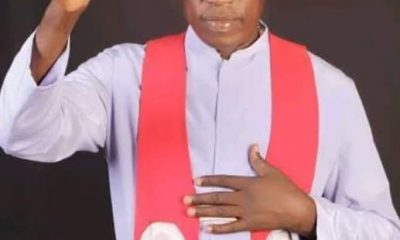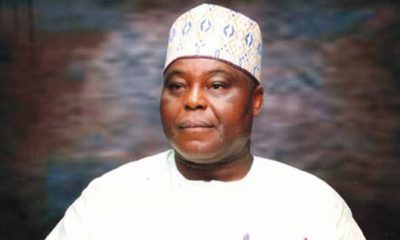News
The Marabouts of Yahaya Bello

By Festus Adebayo
The enchanter recited the incantation with utmost fury: “River Niger and River Benue, the confluence is in Kogi State. Except say River Niger and River Benue no come meet for Kogi; if River Niger and River Benue come meet for Kogi, dem no go fit arrest Bello… Dem dey use EFCC pursue am, dem no go succeed o. Dem go lay siege for im house for Abuja… Except say I no be born of Igala kingdom… EFCC dey front, you dey back; you dey back, dem dey front; you dey left, dem dey right; you dey right, dem dey left; you dey centre, dem come there, you jump dem pass!…a lion cannot give birth to a goat…”
The repertoire is a typical exchange in African rituals. The target was the Economic and Financial Crimes Commission (EFCC), an organisation headed by Ola Olukoyede. Olukoyede is said to be a pastor in Enoch Adeboye’s RCCG. So, three men gather in a place that looks like a forest. Woven around the heads of two of them like a bandana is a white cloth. They crouch on their knees. The third, kneeling in the middle, carries a brown pot from which oozes a thick smoke. Libation ingredients are ready. They are a black cock, tortoise, a green bottle which ostensibly harbours in its bosom sacrificial liquor. The liquor is then sprinkled on the ground as libation. Two egg-like objects complete the ingredients of sacrifice. Either as an effigy or in person, the presence of the recipient of the ritual is always needed. His spirit needs to connect with the spirits.
So, a portrait of the man who gave himself the sobriquet of White Lion, Yahaya Bello, is procured for the libation process. He is dressed in all-white attire like the god, Obatala. Obatala is a Yoruba god of purity. Then the one who looks like the chief priest begins to render a monologue that is known in African ritual practice as incantation. It is similar to the allocutus lawyers enter into on behalf of their guilty client. The aim is for the de-escalation of the pursuit of Bello by the EFCC, his alleged theft of Kogi state’s N82 billion notwithstanding. Bello’s matter got escalated towards the end of the week when the EFCC chairman alleged that the ex-governor paid in advance, the sum of $845,852.84 to the Abuja school of his children. Bello has made a feeble attempt to denounce this from his hiding hole with the ill logic that it was paid with his hard-earned sweats. Why the rush to pay school fees till 2034 if where the money was got today would remain permanent?
Yahaya Bello and his apologists have been spurting out bunkum. They allege that the EFCC is hounding him. Let us assume they are right. First, it is shameful for a self-styled lion to hide inside a hole like a coyote, thereby eating stale food reserved for effeminate animals. Don’t they say that the leopard, and by extension, the lion, does not eat stale food? (Ekun kii je’ran ikasi). It is thus lawless of Yahaya Bello not to honour the anti-graft body’s lawful invitation. Bello’s eight-year reign was notorious for his naked stomping on the opposition’s human rights, running a government fittingly described as an orgy of violence. Why are executioners always afraid when swords are flung in their faces
His is reminiscent of the story of an executioner in the Old Oyo Kingdom whose speciality was in decapitating his victims with relish. Upon courting the ire of the Alaafin and being sentenced to death, the ex-executioner suddenly became jittery. When the man about to decapitate him began to do the traditional acrobatics pre-cutting off of his head, jittery, the ex-executioner’s voice shaky, he asked what part of his body would be cut off, “My head or feet?” Celebratory townsmen who had gathered to witness his comeuppance were angered and demanded rhetorically what part of his victims’ bodies he relished in cutting off during his reign of terror.
Anthropologists in the pre-colonial era of the 20th century studying witchcraft were shocked. They had earlier submitted that occult practices would die with modernisation and urbanisation. However, in the last two decades, modernity seems to have lost the battle in Africa. The miserable and insecure nature of everyday life has made African politicians go two steps backwards. Rather than the Gods of Christianity and Islam which they inherited from the colonisers, they have gone back to ancient practices preceding the incursion of Arab and European lords. Now, the patronage of priests, priestesses of divinities, herbalists, sorcerers and occults is key to the resolution of political dilemmas. Politicians use charms, amulets, rings, belts, rituals, and incantations for the attainment of political goals. Whether it was a skit or reality, that viral video of enchanters seeking Yahaya Bello to be set free typifies the usual scene in power relations in Africa. In the bid to attain, sustain or vend off irritants in political power struggles, there is widespread evidence confirming that many Africans today strongly hold on to beliefs that they got from traditional cosmologies. These have now constituted the core of their everyday lives. The Kenyan Mau Mau revolt is said to have been fought with African magical powers.
Magical and ritual practices are pervasive in power relations in Nigeria. This affirms that when complicated issues and challenges of life confront Nigerian politicians, they quickly run to their traditions and origins. This equally demonstrates the ease with which they momentarily throw away their Christian and Islamic cloaks to hold on to the utilitarian purpose that magic and sorcery serve them. Late University of Leiden scholar, Stephen Ellis, in a 2001 article, “Mystical Efforts: Some evidence from the Liberian war” (Journal of Religion in Africa, XXX1, 2) described how young fighters in the Liberian war, sporting amulets which assumably made them bullet-proof, filled the streets with corpses. Monrovians were shocked at how the soldiers “(disembowelled) the bodies of their victims and (eat) their flesh or internal organs, particularly the heart.” The art of eating a human heart is borne of a residue of practices in Africa. The belief is that a person’s essence is contained in the heart and the blood. So, once the hearts and blood of these warriors are eaten and drunk, “the one who had just eaten them acquires some of the power formerly possessed by his victim.”
Wherever Bello is at the moment, no one needs to be told that he is engrossed with one or a combination of three elements in the bid to confront the coercive power of the Nigerian state. In the tragedy that is Yahaya Bello, these three elements must be making gross harvests from his calamity. They are, on the one hand, the religious combine made up of Pastors, Alfas and African indigenous religious rituals and magic. The second is, lawyers scrambling to profit from what they perceive as the loot from Kogi. Some shameless ones gathered in court last week to protest against the EFCC. The third is bloggers/journalists who by now must have offered to defreeze adversarial comments against him on traditional and social media platforms.
As guest speaker at a two-day education summit held in Port Harcourt, Rivers state in 2013, Nobel Laureate, Prof. Wole Soyinka, waded into the now popular syncretic practices among Nigerian leaders. His particular beef was with Nigerian leaders’ dependence on consultation of marabouts and prophets to acquire and sustain political power. “Give me the name of any head of state who has not been consulting marabouts and prophets and so on, sacrificing goats, animals in the dead of night to receive a third term in office and so on,” he said. The veiled reference was to Olusegun Obasanjo. Marabouts have become notorious for the incestuous relationship between politics and religion in northern Nigeria. They are traditionally Muslim religious leaders and teachers who functioned historically as chaplains serving in the Islamic army of North Africa, the Sahara, and the Maghreb.
Soyinka was right. After the Gideon Orkar volley of bullets on the Dodan Barracks seat of power had subsided, it occurred to General Ibrahim Babangida that kinetic power alone could not guarantee his safety in power. IBB was reported to have consulted marabouts from Senegal who promptly buried live cows in Aso Rock to guarantee his fortification. The same went for General Sani Abacha who reportedly imported seasoned marabouts to spiritually guard Aso Rock. Bowels of the four corners of Abuja reportedly opened up their wombs and swallowed countless cows in sacrifice. Marabouts from Cameroun were also said to have assured the then Vice President Atiku Abubakar that Olusegun Obasanjo would not have a second term, thus exacerbating the animosity between the president and his vice.
Spiritism is not strictly a Nigerian phenomenon in power relations. In political in-fighting among political elites, the belief is that, once the elites gain access to the spiritual world, they have clinched the needed vital resource in the constant struggle to secure an advantage over their political rivals. Communication with the spirit world, the use of sacrifices and protective objects, and divinations were potent means of achieving this. For instance, in Senegal, marabouts or Islamic holy men who belong to Sufi brotherhoods, wield such phenomenal influence that made them a source of political influence for decades. When Zimbabwe was fighting its war of liberation, the advice offered by mediums, believed to be possessed by spirits of ancestors, constituted a major requirement for anyone who sought the people’s political support.
President Felix Houphouet-Boigny was an example. A devout Catholic, he was said to have privately resorted to African mediums. Mobutu Sese Seko of Zaire also ran a government of elite conspiracy of witches where marabouts were consulted at every point for the enhancement of political power.
For very many other African heads of state, clerics and known spiritualists were their advisors. Kenneth Kaunda was top among them. As president of Zambia, he had an Indian, Dr Ranganathan, as a consultant on power matters. So also did President Mathieu Kerekou of Benin. He had a Malian marabout called Mohamed Amadou Cisse, also known as ‘Djine’ or ‘the Devil’ as his spiritual advisor. Cisse once publicly espoused the Devil. He was hitherto advisor to some other African leaders like Mobutu and Omar Bongo of Gabon. Kerekou later appointed Cisse minister of state whose responsibility in the Beninese government was secret services. President Didier Ratsiraka of Madagascar too had a palace that boasted an extravagant temple dedicated to the Rosicrucian god. So also did Paul Biya of Cameroon and Joaquim Chissano of Mozambique, both of whom were followers of Transcendental Meditation.
Marabouts, herbalists, sorcerers and occult chiefs of the Yahaya Bellos of this world and other African leaders become repositories of highly confidential state information. These are in the process of spiritual interventions for the captive leaders. Feckless and desperate in the bid to attain and cling to power, they divulge details of innermost governmental secrets to them. A 1998-published journal article written by Stephen Ellis and Gerrie ter Haar with the title, “Religion and Politics in Sub-Saharan Africa” (The Journal of Modern African Studies, Vol. 36, No. 2, pp. 175-201) discusses how leading marabouts have pre-knowledge of coups and other secrets of power. Amadou Cisse, for instance, knew virtually all the secrets of power in Benin. So did another marabout, Amadou Oumarou ‘Bonkano’, who was appointed chief of the national intelligence service. Having known details of President Seyni Kountche of Niger’s operations, Oumarou attempted a coup against Kountche, his patron and employer.
At a random and conservative estimate, 90% of Nigerian politicians, aside from the Christianity and Islam that they profess in broad daylight, patronise priests, herbalists, sorcerers and occults. They probably have discovered that the immediacy of execution that these African deities possess cannot be found in the Western God. Again, I tend to submit that the rash of theft of public money among them is borne out of the presumed fortification they are promised by African deity priests and priestesses. They offer human beings as sacrifices in the process. Unknown to them, they kill the proverbial hunchback, Abuke Osin, the favourite servant of the Obatala god, in the process of acquiring these powers. Unjustly shed blood fights back.
According to a renowned living archive of Yoruba traditional institution, Yemi Elebuibon, in his The Adventures of Obatala: Ifa and Santeria God of creativity, (2016) the hunchback was one of the faithful servants of Obatala who he sent on errands. Having become rich due to his generosity to the Abuke Osin, Tortoise, Alabahun the fabled trickster, envied Ojugbe, his neighbour. Impressed by his generosity to the hunchback, Obatala chanted some incantations which deposited precious beads, gold and other ornaments inside the carapace-like chest of the hunchback. So when Ojugbe rubbed the hunchback’s chest, he became stupendously wealthy. Stingy and unable to compete with Ojugbe-kind generosity, Tortoise lured Abuke Osin into his house and forcefully rubbed his chest which refused to emit money. He then killed this servant of Obatala and incurred the wrath of the god.
The moment the Nigerian state allows Yahaya Bello, for whatever reason, to escape the wrath of the law, its last lever of strength will snap off. Whoever kills the Abuke Osin should pay dearly for it.
News
Gov Alex Otti visits Nnamdi Kanu in Sokoto prison

Alex Otti, the Abia State Governor, on Sunday paid a visit to the detained leader of the Indigenous People of Biafra (IPOB), Nnamdi Kanu, at the Sokoto Correctional Centre.
The governor was accompanied by officials of the Sokoto State Government during the closed-door visit.
Nnamdi Kanu was recently moved to Sokoto after he was convicted on terrorism-related charges and handed a life sentence by a Federal High Court in Abuja.
Governor Otti had earlier promised to pursue every lawful and political avenue to ensure that Kanu gets justice. Sunday’s visit is seen as part of ongoing efforts by the Abia State Government regarding his case.
Details of the meeting were not made public as of the time of this report.
News
Terrorists abduct bride, bridesmaids in Sokoto attack

Armed terrorists have abducted a bride-to-be, her bridesmaid, and eight other residents from Chacho village in Wurno Local Government Area of Sokoto State
The Sokoto abduction occurred around 1:30 a.m., according to residents, when the attackers stormed the village. Most of the victims were women, with only one man also taken.
One resident sustained injuries and is receiving medical treatment. Villagers told reporters that the bride was preparing for her wedding scheduled for later that morning when the raid struck, plunging the community into shock and mourning.
A community member described the attack as “tragic,” noting the delay in security response. “Security operatives were alerted immediately, but they only arrived about an hour after the bandits had fled,” he said, expressing frustration.
Business
Dangote Refinery to supply 1.5bn litres of petrol monthly

….Writes NMDPRA, Engages Marketers to Stabilise Fuel Market
Photo caption: L R: Chief Executive Officer, Dangote Fertiliser Limited, Vishwajit Sinha; Chief Executive Officer and Managing Director, Dangote Petroleum Refinery, David Bird; President and Chief Executive, Dangote Industries Ltd, Aliko Dangote; Managing Director and Chief Executive Officer, South South Development Commission, Usoro Akpabio, during the visit of SSDC members to the Dangote Petroleum Refinery and Fertiliser Plant in Lagos on Sunday, November 30, 2025.
Dangote Petroleum Refinery has announced plans to supply one billion five hundred million litres of Premium Motor Spirit (PMS) monthly to the Nigerian market in December 2025 and January 2026, a move aimed at ensuring uninterrupted nationwide fuel availability through the festive season and into the New Year.
President and Chief Executive of Dangote Industries Limited, Aliko Dangote, disclosed the plans at the weekend, noting that the refinery will make available 50 million litres of PMS daily beginning December 1.
“In line with our commitment to national wellbeing, and consistent with our track record of ensuring a holiday season free of fuel scarcity, the Dangote Petroleum Refinery will supply 1.5 billion litres of PMS to the Nigerian market this month. This represents 50 million litres per day. We are formally notifying the Nigerian Midstream and Downstream Petroleum Regulatory Authority (NMDPRA) of this commitment. We will supply another 1.5 billion litres in January and increase to 1.7 billion litres in February, which translates to about 60 million litres per day,” Dangote said.
Photo caption: L R: President and Chief Executive, Dangote Industries Ltd, Aliko Dangote; Managing Director and Chief Executive Officer, South South Development Commission, Usoro Akpabio, during the visit of SSDC members to the Dangote Petroleum Refinery and Fertiliser Plant in Lagos on Sunday, November 30, 2025.
Speaking during a visit by the South-South Development Commission (SSDC) to the refinery and the Dangote Fertiliser complex, he stated that the facility currently has adequate stock and is producing between 40 and 45 million litres of PMS daily. He added that the daily supply of 50 million litres should dispel long-standing claims that domestic refineries lack the capacity to meet national demand.
Dangote also revealed ongoing engagement with petroleum marketers to strengthen distribution systems, including expanding the use of CNG-powered haulage.
“Our priority is to ensure Nigeria receives the products it needs. This is not driven by profit motives; it is about guaranteeing the availability of essential energy products. It is similar to the transformation we delivered in the cement sector,” he added.
He further noted that the refinery is progressing with its expansion plan to reach a capacity of 1.4 million barrels per day. More than 100,000 workers are expected to be involved in the expansion of both the refinery and the fertiliser complex. Dangote emphasised that the Group remains committed to its vision, driven by the strong public support for the company’s role in shaping Nigeria’s economic development.
During the visit, the Managing Director of SSDC, Usoro Offiong Akpabio, commended Dangote’s leadership and his continued contribution to strengthening Nigeria’s industrial capability, national energy security and long-term economic competitiveness.
She described the South-South region as Nigeria’s natural energy corridor, with vast crude oil reserves, gas infrastructure, maritime assets, agro-industrial activity and emerging industrial clusters. She noted that deeper collaboration between the region and the Dangote Group could unlock opportunities in product distribution, CNG infrastructure, petrochemicals, agriculture, and employment creation.
Akpabio added that such partnerships would advance the Federal Government’s energy stability agenda and position the South-South as a strategic growth hub for the Dangote Group.
“As the statutory development body for the South-South, SSDC is mandated to drive regional economic development, infrastructure integration, human capital advancement, and private-sector–led growth. In this regard, we stand prepared to support State-level policy and regulatory support for Ease-of-doing-business across our six states. Enabling environments for Dangote Group’s expansion into strategic sectors such as gas processing, agro-industrial value chains, renewable energy, logistics, and export-oriented manufacturing,” she said.
In a letter from the refinery’s Managing Director, David Bird, to the Authority Chief Executive of the NMDPRA, the company reaffirmed its readiness to host NMDPRA officials onsite at the refinery from December 1st to verify and publish its daily supply volumes. The refinery also sought the Authority’s support to ensure unhindered importation of crude, feedstocks and blending components, as well as smooth vessel loading for product evacuation.
“In the spirit of full transparency to the public we are willing to publish our daily production and stock volumes (online and print media),” Bird stated. “We seek the full support of NMDPRA to allow Dangote refinery to import our crude, feedstocks and blending components unhindered as well as support the lifting of our products by vessel. We continue to experience delays in vessel clearance which impacts not only the refinery operations but also our customers, adding unnecessary costs and inefficiencies”.
-

 News2 years ago
News2 years agoBreaking: Tinubu’s authentic ministerial nominees
-

 News9 months ago
News9 months agoSenate to speed up conclusion of Nigeria Forest Security Service Bill
-

 News2 years ago
News2 years ago“Anytime we want to kill terrorists, President would ask us to take permission from France but they were killing our soldiers-” Niger Republic coup leader
-

 News2 years ago
News2 years ago“I’m leaving the Catholic church because Bishop Onah is oppressing me,” says Okunerere
-

 News2 years ago
News2 years agoRadio Nigeria’s veteran broadcaster Kelvin Ugwu dies three months after retirement from service
-

 News2 years ago
News2 years agoDokpesi and the Gazebo Mystique
-

 News2 years ago
News2 years agoTsunami: Tinubu orders dissolution of managements, boards of MDAs, to sack all Buhari’s political appointees
-

 News2 years ago
News2 years agoPersons against Allagoa’s reforms behind protests at NSITF

